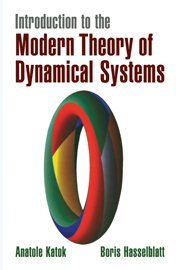Book contents
- Frontmatter
- Contents
- PREFACE
- 0 INTRODUCTION
- Part 1 Examples and fundamental concepts
- Part 2 Local analysis and orbit growth
- Part 3 Low-dimensional phenomena
- 10 INTRODUCTION: WHAT IS LOW-DIMENSIONAL DYNAMICS?
- 11 HOMEOMORPHISMS OF THE CIRCLE
- 12 CIRCLE DIFFEOMORPHISMS
- 13 TWIST MAPS
- 14 FLOWS ON SURFACES AND RELATED DYNAMICAL SYSTEMS
- 15 CONTINUOUS MAPS OF THE INTERVAL
- 16 SMOOTH MAPS OF THE INTERVAL
- Part 4 Hyperbolic dynamical systems
- Appendix: BACKGROUND MATERIAL
- NOTES
- HINTS AND ANSWERS TO THE EXERCISES
- REFERENCES
- INDEX
13 - TWIST MAPS
Published online by Cambridge University Press: 05 June 2012
- Frontmatter
- Contents
- PREFACE
- 0 INTRODUCTION
- Part 1 Examples and fundamental concepts
- Part 2 Local analysis and orbit growth
- Part 3 Low-dimensional phenomena
- 10 INTRODUCTION: WHAT IS LOW-DIMENSIONAL DYNAMICS?
- 11 HOMEOMORPHISMS OF THE CIRCLE
- 12 CIRCLE DIFFEOMORPHISMS
- 13 TWIST MAPS
- 14 FLOWS ON SURFACES AND RELATED DYNAMICAL SYSTEMS
- 15 CONTINUOUS MAPS OF THE INTERVAL
- 16 SMOOTH MAPS OF THE INTERVAL
- Part 4 Hyperbolic dynamical systems
- Appendix: BACKGROUND MATERIAL
- NOTES
- HINTS AND ANSWERS TO THE EXERCISES
- REFERENCES
- INDEX
Summary
We now return to the study of twist maps which we began in Sections 9.2 and 9.3. The main result of those sections was the existence of at least two special periodic orbits for any rational rotation number from the twist interval (Theorem 9.3.7). Those orbits (Birkhoff periodic orbits of type (p, q)) can be regarded from two different viewpoints. On the one hand they are special minimal and mountain-pass-type minimax critical points of the action functional (9.3.7) on the space of periodic states. The minimal Birkhoff periodic orbits are, in fact, characterized by the property that each of their segments minimizes the action functional (9.3.12) defined on the space of states with the same endpoints. On the other hand those orbits are order preserving, that is, their angular coordinates are in one-to-one order-preserving correspondence to the orbits of the rotation by the angle 2πp/q (cf. the remark after Definition 9.3.6).
In this chapter we will extend both aspects of this study to include orbits with irrational rotation number. We will use extensively the structural theory of circle homeomorphisms developed in Chapter 11. In Section 13.2 we concentrate on the preservation of order and in Sections 13.3–13.4 on the variational description. The most striking conclusion is that whereas for circle homeomorphisms Denjoy-type orbits whose closures are minimal nowhere-dense sets occur only for maps of low regularity (Theorem 12.1.1), for twist maps similar orbits, whose closures (Aubry–Mather sets) project to nowhere-dense Cantor sets in the circle, appear in arbitrarily smooth systems as a rule rather than the exception.
Information
- Type
- Chapter
- Information
- Introduction to the Modern Theory of Dynamical Systems , pp. 423 - 450Publisher: Cambridge University PressPrint publication year: 1995
